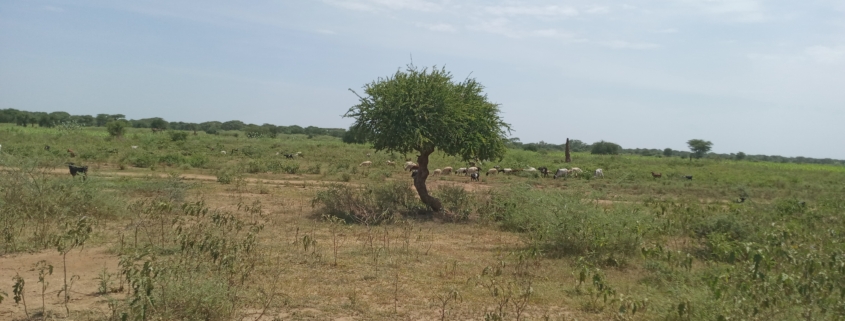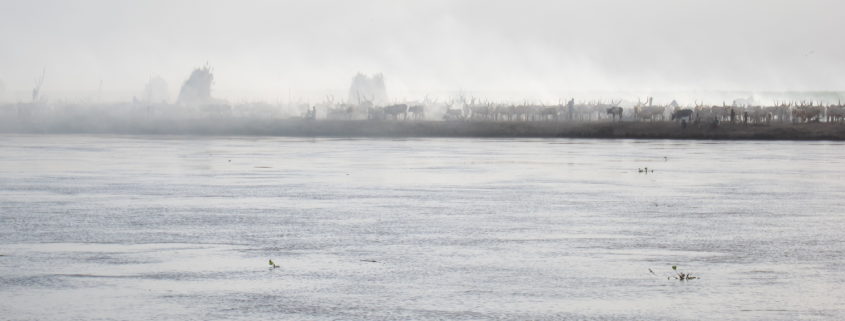This report explores how climate change can intersect with conflict in South Sudan. Using case studies of Kapoeta and the Mangala-Bor corridor, the report finds that climatic events, such as drought and flooding, remain key contributors to migration and violence, including gender-based violence. To mitigate the effects of climate change on conflict, the report provides conflict-sensitive recommendations for aid agencies and donors operating in both drought and flood-hit areas across the country.
repository
CSRF Research Repository
The CSRF Research Repository aims to support greater contextual knowledge for policy makers, programme managers, and implementers by providing a searchable repository of research, analysis, and resources, and providing periodic updates on new research and analysis.
Kapoeta, a semi-arid area,[1] has been experiencing severe drought conditions since 2021 caused by climate change.[2] The changing conditions have reportedly resulted in the spread of invasive weed species in the last two to three years. These include Beku (local name) with the scientific name Prosopis Juliflora and Abonglogir (local name) with the scientific name Parthenium. Invading farms, grazing land and roadsides, these weeds have a devastating impact on livelihoods, such as farming…
Abstract Motivation In 2020, the UK merged the Department for International Development (DFID) with the Foreign and Commonwealth Office (FCO), as the Foreign, Commonwealth and Development Office (FCDO). This policy move strengthens the trend to securitize development, whereby the provision of aid is motivated by national security concerns. Purpose Many researchers have raised concerns about the securitization of aid and its consequences for development, but little research has examined its impact on aid‐recipient countries. Approach…
The population dynamics presented in this paper have serious implications for South Sudan’s human development and political stability. Using census data and UN estimates, this briefing paper highlights South Sudan’s recent demographic patterns and trends, starting in 2008 into 2050. The projections presented are based on an exponential growth regime, and the analysis seeks to provide key insights for the aid community to stimulate their thinking on the nature and level of support likely to…
The effects of climate change are expected to be greatest in the Horn of Africa countries, particularly those, such as South Sudan, whose populations are reliant on rain-fed agricultural production to meet their food and income needs. As one of the least developed countries in the world, South Sudan’s population is dependent on climate sensitive natural resources for their livelihoods, making the country particularly vulnerable to the effects of climate change. South Sudan’s future economy…
There is growing recognition of the interaction between aid and the drivers of conflict. In South Sudan, the scale and nature of this international assistance make it inevitable that aid will affect the economic, social and political drivers of conflict for better or worse. This has led to increased interest in and support for promoting more conflict-sensitive approaches to the design, delivery and management of aid. This paper explores the challenges associated with promoting more…
As aid actors in South Sudan, most of us believe in and can see the value of what we’re doing on a day-to-day basis. We can see the positive impact of aid on people’s lives. But we also wonder in quiet, dark moments what the sum total of our impact is. Aid has been delivered here for decades, so why are things still so bad? Do we play a role in that? And if so,…
International aid is an important part of the political economy of South Sudan and interacts with government, including state and local structures and authorities, in a continuous and evolving manner. Innovation, cooperation, mistrust, and conflict have characterised the relationship between the broader international aid community and the structures that produce and exercise authority in this diverse land. Since the 2013 civil war, though, this relationship has been dominated by mistrust as the international narrative towards…
Despite increasing recognition among international organizations that livelihood security, sustainable peace, conflict prevention and gender equality are complementary goals that require integrated policy approaches, there is to date limited evidence about the links between these key development pillars. This article provides an analysis of the links between food security, sustainable peace and gender equality, by making use of three case studies including Abyei to illustrate how specific policy interventions can simultaneously address the differentiated priorities…
This briefing note explores the interaction between gender norms of masculinities and femininities, and capacities for peace and conflict in areas that are receiving assistance. The aim of the research on which this publication is based on is to better understand how gender norms, including violent notions of masculinity and gender inequality in Greater Lakes State and Western Equatoria State may be affecting: the scale and the nature of conflict and violence; the roles played…

Some Infos
Lorem ipsum dolor sit amet, consectetuer adipiscing elit. Aenean commodo ligula eget dolor.
Pages
- About Our County Profiles
- Blog
- Case Studies Grid
- Central Equatoria
- Conflict Sensitivity Resource Facility South Sudan
- Contact Us
- Contribute a Repository Article
- County Profile HTML links
- County Profiles
- COVID-19 HUB
- Covid-19 information page
- CSRF About Us
- CSRF Helpdesk
- CSRF Helpdesk Form
- CSRF Login
- Dashboard
- Deliverables
- Demo
- Events
- Forgot password
- Guides, Tools and Checklists
- Helpdesk
- Home
- Latest
- Looker Studio
- Subscribe


